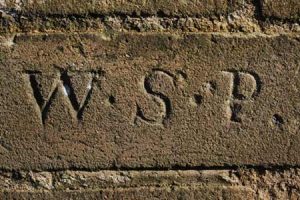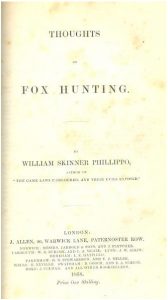William Skinner Phillippo and the Norfolk Fox Hounds
Even during the so-called “golden age” of hunting during the 19th Century, the sport was no more popular amongst people of the countryside than it is today. This letter by William Skinner Phillippo to the Norfolk News in 1856 illustrates how the problems of fox and other game hunting – including how it hides behind the machinations of Law – haven’t changed in more than 150 years.
William Skinner Phillippo emerged into history as the son of George and Margaret, neé Skinner, Phillippo at Letheringsett Hall near Holt. Born 1806, his father George was a junior farm steward to brewing magnate William Hardy for many years before the Phillippo family eventually moved to the small village of Barney, near Fulmondeston. This must have been after 1814 because at the age of eight the young William carved his initials into a brick that was then laid into a tun room wall at Letheringsett Hall.
Not much appears to be known about the majority of his life but occasional ripples have continued cresting through time. After moving to Barney it seems that either he or his family acquired their own land and farm that they probably used to get by. A barn from the farm remains to this day, with one containing declarations of persecution that can be read fully here:
‘This memorial is erected to transmit to prosperity / the fact that in the middle of the 19th century / the owner of this estate was committed for 14 days / imprisonment in a Felon’s jail by two / clerical / Justices for having taken and eaten his own game / out of season as decreed by English statute law.’
This provides us with insight into his problems with the system of Law, something that he seems to have found not just overbearing but actively ridiculous.
Around this same period a greater insight into William’s troubles with law and injustice comes into the public consciousness through a letter published in the Norfolk News on 6th December 1856, in which he rails against the Norfolk Fox Hounds and the hypocrisy of a Law that has biased class interests.
This is a long and occasionally rambling letter yet one that in sentiment could have been written today. Spelling and grammar preserved in transcription.
FIVE POUNDS REWARD
WHEREAS, on Tuesday, the 25th day of November, instant, some malicious and evil disposed persons, did, at noon day, wilfully break down the fences, enter, trespass upon, and damage two wheat fields in the parish of Barney, in my possession, by riding around them and across them in various directions, plunging it in, in some places, fetlock deep, and in others scattering it upon the surface and doing it irreparable injury; whoever will give such information as will lead to their apprehension and conviction, shall receive the above reward.
And I also hereby give Public Notice to the Noble Lords the Masters of the Norfolk Fox Hounds, their subscribers and adherents, that if they will persist in crossing the Lands in my possession in the parishes of Barney and Wood Norton, for the purposes of Fox Hunting, or any other foolish or wicked pastime, after this public notice, they will be deemed trespassers, and prosecuted as such according to the Law.
WILLIAM SKINNER PHILLIPPO
Barney, Nov 27th, 1856
To the Editor of the Norfolk News
SIR – Some time since you did me the honor to insert anything I chose to write respecting game, game laws, and hunting – in fact you seemed to court my correspondence; but since you have had a batch of game-preservers to court in order to obtain the county advertisement, you now act Louis Napoleon towards me, and want to gag me by denying me space in your columns. I beg to say I will not be gagged by either you or Bonaparte.
Had you inserted my letters on hunting, &e, in September last, before the hunting commenced, what has now taken place would not have occurred; for very many of the hunters knew that I was shut out from the other papers and boasted that they had made it all right with you, and that you would not listen to me (which appears to be correct by your refusal to insert my last three or four letters). They threatened to “do me a kindness” the very first day they met, for they would ride all about my wheats, &e, and they have performed their threat to the very letter, for they have literally ploughed them up.
I will submit to such treatment no longer, but will play the part of the man in Aesop’s Fables, who, when he found the boys robbing his apple tree, pelted them with tufts of grass, which only made them laugh and jeer, as the hunters do me; but after he used stones, they were very quickly brought down. I will do the same. If, after this public notice, which is the second time, these lawless invaders of the rights of property should think fit to injure me again, instead of using as I have hitherto done, tufts of grass as it were, or defensive weapons furnished by Gillott; I will use stones, or weapons furnished by Minié and Colt.
It is well known in my neighborhood, that I cannot obtain either law or justice for any of the game-preserving magistrates around me; therefore, I will act as in days of yore, and seek retribution with my own hands, and serve it out to those field-burglars who break into my inclosures at noon-day, the same as I would the house-burglars who break into my apartments at mid-night.
I well remember the injuries I sustained by the late Norfolk Fox Hounds during the few years I was in business, before they were given up, for which see my pamphlet. I was a great sufferer – and when I complained, I received in return nothing but threatenings, blackguardism, and abuse, from men of rank, whose supposed education and position in society ought to have taught them better.
Through a course of honest industry, I have acquired a little property, and I have always been taught from my youth up, to consider property as sacred and inviolable, but with hunting lords and law-makers it is not so.
Now, Mr. Editor, one word with you: if you won’t allow me to occupy your space without paying for it, so it must be. One of your contemporaries in last week’s paper says, if “one puts his name to his letter, and makes himself answerable for its insertion, it shall appear;” then why should you not grant the same privilege? Just call to mind that you have been running for the road for sometime past with a spirited team of young horses, and have fairly outstripped you competitors with their old fat, sluggish ones – nay, one has put them abreast, and yet can’t keep up with you.so don’t begin to rein up, jockey, and punish, now you have gained the lead.
You see what an effect the accursed game law, as well as hunting, has upon society in general, and more especially the lower classes; – in the Holt rabbit case – that the men are legally convicted there is not the least doubt […]. But what must the masses think of that Justice of the Peace who could send a poor man to the prison for a month’s hard labor for catching a rabbit on his own commons to support a wife and four children! whilst himself has ordered them to be shot by the dozens – aye, by the cart loads, on whose own domain, within the last three months, and thrown about his woods as food for foxes, turned all for sport for the sanguinary hunter, whose motto is,
“Foxes must be fed, if the poor have to starve.”
In conclusion, I have to say that I cannot agree with your contemporary in his last Saturday’s impression respecting them, for he says, let “the Devil take the hindmost;” but I say, “let him take all – but more especially the foremost.”
I remain Sir, your obedient servant,
WILLIAM SKINNER PHILLIPPO
Barney, December 2nd 1856
During the same year William published a book titled “Thoughts on fox hunting” (likely the pamphlet he refers to in the above letter), the second of a bibliography that shows him as an individual at loggerheads with the prevailing politics of his day. Other titles include “The Game Laws Considered and their Evils Exposed” (1856) – the first of his publications – “Opinions on the Ballot, Annual Parliaments and Universal Suffrage” (1869), and “Spirit of the Age; the Cause of Strikes” (1872).
William died in June 1888.
Tags: 1856, anarchism, anarchy, animal liberation, barney, history, hunt sabbing, lethersingsett, norfolk, norfolk fox hounds, radical, william skinner phillippo


